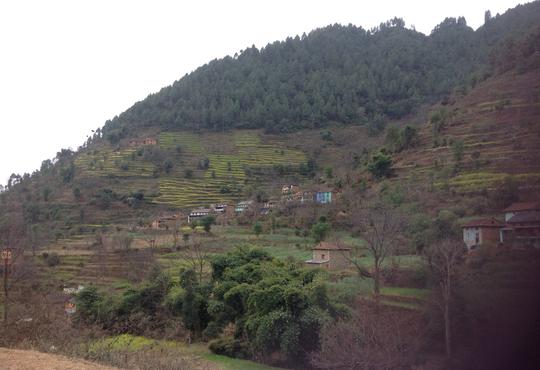Farewell Gráinne...
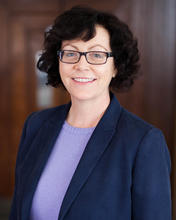 Members of the St. Paul's community and International Development (INDEV) program gathered at the end of August to say farewell to our friend and long-time colleague Gráinne Ryder who took early retirement after about 10 years with INDEV/St. Paul's. Gráinne managed the overseas field placements for the program, was the on-campus lead for the student refugee program and taught courses in International Development in recent years.
Members of the St. Paul's community and International Development (INDEV) program gathered at the end of August to say farewell to our friend and long-time colleague Gráinne Ryder who took early retirement after about 10 years with INDEV/St. Paul's. Gráinne managed the overseas field placements for the program, was the on-campus lead for the student refugee program and taught courses in International Development in recent years.
She and her partner Kieran will split their time between Ireland and Spain and have plans to write, travel and enjoy life. Prior to her departure, as would be expected by anyone who knows her, Gráinne took the opportunity to share some funny and poignant stories about her time visiting students in the field. She also imparted some great advice to her successor and reflected on what it was that made her time at St. Paul's enjoyable.
In her latest post-retirement update, Gráinne says that she is enjoying speaking Spanish with the market vendors while shopping daily for fresh food, walking on the beach and exploring the local restaurant scene. Currently, she and Kieran are thinking about a trip to Morocco in December.
We will miss Gráinne's wit and wisdom but wish her well in the next leg of her journey!
...welcome John!
We are pleased to announce the arrival of John Abraham as Continuing Lecturer and Manager of International Work Experience for the INDEV and Masters of Development Practice (MDP) programs. John joined the College community in early August and takes over from Gráinne Ryder.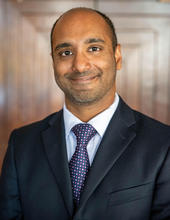
John will be working with our partner organization, the World University Service of Canada, and others, to develop high-quality field placements and prepare students for a challenging cross-cultural and professional experience in Africa, Asia, and Latin America.
John received his PhD in Politics and International Relations from Royal Holloway University of London (2015), MPhil in Modern South Asian Studies (2001) from the University of Cambridge and a BA in Religious Studies (1999) from the University of Calgary. His research and areas of expertise include Political Economy, South Asia and Social Innovation and Entrepreneurship.
Prior to joining St. Paul’s and University of Waterloo John was Assistant Professor, Global Studies and Social Entrepreneurship at Wilfrid Laurier University.
INDEV Alum draws upon life-changing experience to pursue career in emergency preparedness
Moira Hennebury INDEV class of 2015 was one of eight INDEV students who departed Nepal less than 48 hours before the devastating earthquake of April 25, 2015. She recently started a new job as an Emergency Preparedness Specialist at Sunnybrook Hospital. We asked if she would share some insight about her career path following her INDEV placement in 2014/15.
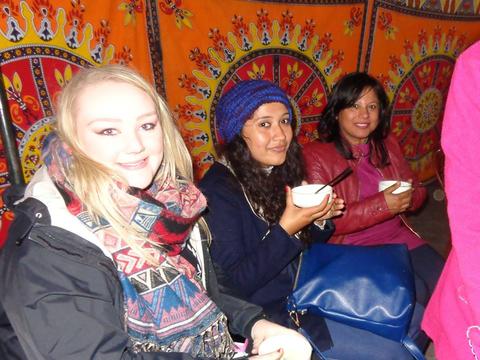
Moira, with two of her colleagues in Nepal
April 25th, 2015, is a day that remains forever etched in my mind. It was just past one in the morning when my phone screen glowed. A brief glimpse revealed that it was my friend Tommy, an Australian engineer who worked for the National Society for Earthquake Technology Nepal. We had parted ways just two days before, when he had met the “INDEVOURS” crew at Tribhuvan Airport to snap one last group photo before we caught our flight home. He must be checking in on me, I thought, having landed in Toronto just hours before. Instead, I read, “There has been an earthquake”. Those five words marked a truly pivotal moment in my life.
As a culmination to my undergraduate degree in International Development, I travelled to Kathmandu for an eight-month internship at the Centre for Microfinance Nepal (CMF), an organization aimed at strengthening financial service providers, such as banks, cooperatives, and NGOs, through training and policy lobbying. I served the CMF as a Communication and Documentation Intern.
When I arrived in Kathmandu in September 2014, I was immediately warned that The Big One was coming. Media sensationalized the risk – it was commonly reported that a devastating quake would strike by the New Year, 80 years following the 1934 Bihar-Nepal earthquake. Microfinance professionals in my network feared they hadn’t pushed the micro-insurance agenda soon enough. In clandestine, a superior expressed to me that the industry operated on borrowed time – if the earthquake were to be as devastating as anticipated, clients would predictably default on their loans, irreparably damaging the credit portfolio. It was at this time that I first became interested in the concept of disaster risk reduction.
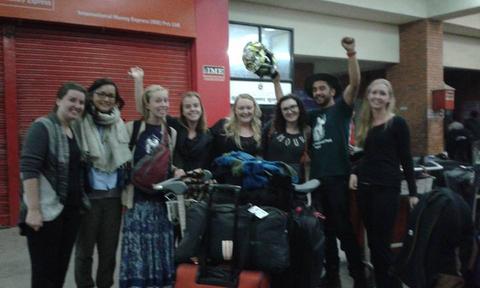
INDEV students at the airport in Nepal prior to their return to Canada
In April 2019, I completed my Masters Degree in Disaster and Emergency Management (MDEM) from York University. Today, I serve as an Emergency Preparedness Specialist at Sunnybrook Health Sciences Centre and the Toronto Central Local Health Integration Network (LHIN). In this role, I support a number of projects aimed at enhancing the preparedness of our health system to emergency events, such as mass casualty incidents. As a profession, hospital emergency preparedness planning requires ongoing assessment of the hazard landscape, followed by the preparation and exercising of emergency response plans. We develop emergency response plans in effort to minimize risk to people, property, and our ability to deliver safe patient care during emergency incidents.
I have struggled to reconcile the events of April 25th, 2015, for some time. It is difficult to imagine the destruction of a country so humble. However, as time has passed, I find myself continually reminded of the collective spirit and culture of resilience that marks the Nepali people. I am forever grateful for the brief time I spent in Nepal. My time as an INDEVOUR allowed me to develop a rich skill set, cultural competency, and the ability to work in resource constrained environments.
My placement in Nepal had a truly transformative impact on my life and my career. Indeed, it is what led me to pursue a career in disaster and emergency management.
International Development students often rely on a variety of scholarships and awards like the Alex Foto Memorial Award to make their 8-month overseas placements more affordable.







